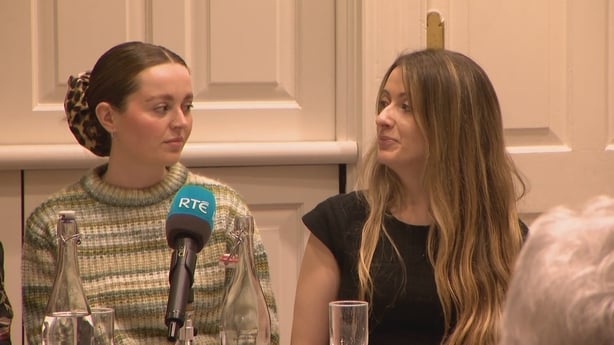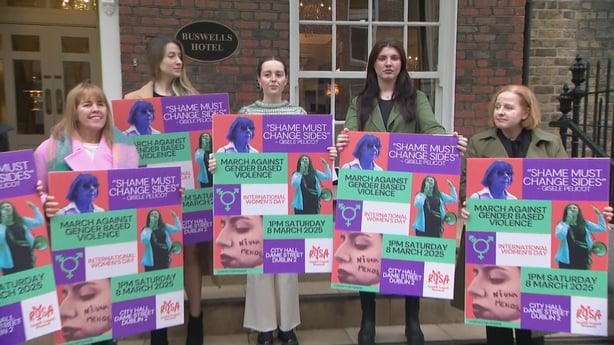Survivors of gender-based violence have called for urgent legal changes to the justice system.
People Before Profit-Solidarity TD Ruth Coppinger will introduce a ten-point plan as part of a Private Members' motion in the Dáil next week calling for action.
United in a quest for justice a number of sexual violence, survivors held a press conference calling for reform.
They said they felt let down by the State and described their experiences of the judicial process as "retraumatising".
The group want the ability of defence legal teams to access counselling or therapy records in sexual violence trials to be removed.
This is one of the suggestions in Deputy Coppinger's ten-point programme.
Survivor Paula Doyle said that some victims stop going to counselling because they do not want the notes to be used in court.
Ms Doyle said that prior to the initial trial date for her attacker, her private counselling notes were requested.
"When I signed up for counselling, I assumed it was confidential between myself and my counsellor - and then for my personal notes to be read, scrutinised by both the prosecuting and the defensive teams for any shred of information that could be used against me as a victim of rape, I think is horrendous."
She added that in the months leading up to the trial, she had to reread the notes taken about her and had to deal with the idea that the perpetrator had the chance to read her private notes too.

"He took my body that night, he invaded it, left it to just lie there like a piece of rubbish when he was finished, and then he gets to read my personal notes, how perverse is that?"
"Some victims actually stop going to their counselling to continue with their [court] case, and they're halting their own recovery because they don't want them [notes] to be used, or then other people close the case because they want to continue with their counselling. Where's the justice in that?"
Another survivor, Sarah Grace who was assaulted five-and-a-half years ago, expressed her frustration with the pace of progress.
"When I first spoke about my trial in 2021, I was invited by the then Minister for Justice McEntee to discuss legal reforms, a very welcome meeting.
"I published an open letter outlining seven major shortfalls of our courts system which needed to be addressed to prevent further unnecessary and disproportionate harm to survivors.
"However, almost four years on, every single recommendation still stands. Not one has been addressed."
We need your consent to load this rte-player contentWe use rte-player to manage extra content that can set cookies on your device and collect data about your activity. Please review their details and accept them to load the content.Manage Preferences
There was a commitment in the latest National Strategy on Domestic, Sexual and Gender-based Violence to examine and review issues around counselling notes.
In a statement, the Department of Justice said any changes to the law would need to be carefully considered to avoid the risk of a constitutional challenge on the right to a fair trial.
It added that Minister Jim O'Callaghan was aware of victims and NGO stakeholders concerns and has asked the Department to finalise this work and present him with proposals quickly.
Natasha O'Brien said that following her experience of the judicial system, she would not encourage victims to go through the same.
"When you're a victim, your power is taken away by the perpetrator and then when you enter into the system, your power is continually taken away.
"You don't have any voice, you're ignored. It's so difficult to find information and so, you're our your own," she said.
Ms O'Brien added: "I was naive, and I didn't know. I didn't know the reality of how traumatising and horrific and challenging the system is, so I foolishly entered it thinking that, you know, I can look for justice and I was met with the harsh reality of retraumatisation.

"It just dragged my pain out, it dragged my trauma out, it compounded it, it exploited it, every part of it was made worse."
Deputy Coppinger will introduce her Private Members' motion in the Dáil next week, calling for action on gender-based violence.
Her ten-point programme includes outlawing character references in cases of gender-based violence.
Survivors said that this can retraumatise victims and can sway judges to mitigate abuse.
In order to "outlaw rapes myths and victim blaming by defence lawyers" in court cases, she has suggested compulsory training of the judiciary and juries regarding sexual and gender-based violence.
She has also called for investment in the courts service to recruit personnel so that nobody wants more than a year for a sexual assault, rape or gender-based violence case.
The plan suggests the introduction of a domestic violence register to make information available about anyone with a conviction for domestic violence.
Survivors at a press conference have called on the public to show their support by joining demonstrations nationwide on 8 March - International Women's Day - when they will call for Government action on gender-based violence.
We need your consent to load this rte-player contentWe use rte-player to manage extra content that can set cookies on your device and collect data about your activity. Please review their details and accept them to load the content.Manage Preferences







